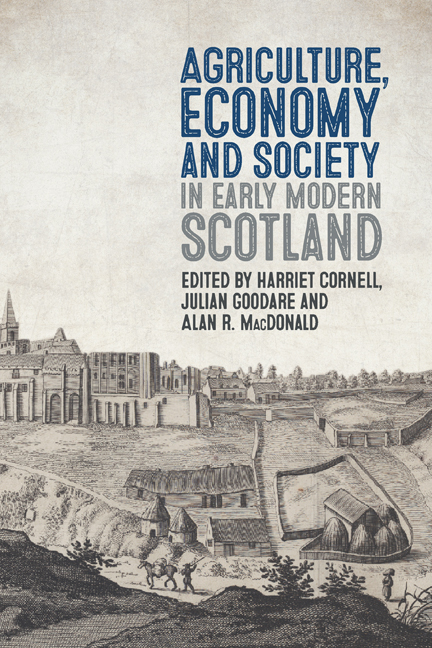Book contents
- Frontmatter
- Dedication
- Contents
- Illustrations
- Contributors
- Acknowledgements
- Note on Currency and Measures
- Abbreviations
- Map of Scotland
- Introduction: Exploring Scotland’s Agricultural History
- 1 Imagining Scottish Agriculture before the Improvers
- 2 The Use of Dykes in Scottish Farming 1500–1700
- 3 The Famine of 1622–23 in Scotland
- 4 Weather and Farming through the Eyes of a Sixteenth-Century Highland Peasant
- 5 Stock, Fermes, Mails and Duties in a Midlothian Barony 1587–89
- 6 The Roots of Improvement: Early Seventeenth-Century Agriculture on the Mains of Dundas, Linlithgowshire
- 7 ‘God Knowis my Sleipis ar Short and Unsound’: Andro Smyth’s Collection of Rent, Tax, Teind and Tolls in Shetland c.1640
- 8 Farming in the Stirling Area 1560–1750
- 9 What Were the Fiars Prices Used For?
- 10 Agriculture and Banking in Eighteenth-Century Scotland 1695–1750
- 11 Capitalism’s Cradle? Ideas, Policies and the Rise of the Scottish Economy in the Mercantilist Age 1600–1800
- Conclusion: A Historiographical and Bibliographical Overview
- Index
- Boydell Studies in Rural History
4 - Weather and Farming through the Eyes of a Sixteenth-Century Highland Peasant
Published online by Cambridge University Press: 14 May 2024
- Frontmatter
- Dedication
- Contents
- Illustrations
- Contributors
- Acknowledgements
- Note on Currency and Measures
- Abbreviations
- Map of Scotland
- Introduction: Exploring Scotland’s Agricultural History
- 1 Imagining Scottish Agriculture before the Improvers
- 2 The Use of Dykes in Scottish Farming 1500–1700
- 3 The Famine of 1622–23 in Scotland
- 4 Weather and Farming through the Eyes of a Sixteenth-Century Highland Peasant
- 5 Stock, Fermes, Mails and Duties in a Midlothian Barony 1587–89
- 6 The Roots of Improvement: Early Seventeenth-Century Agriculture on the Mains of Dundas, Linlithgowshire
- 7 ‘God Knowis my Sleipis ar Short and Unsound’: Andro Smyth’s Collection of Rent, Tax, Teind and Tolls in Shetland c.1640
- 8 Farming in the Stirling Area 1560–1750
- 9 What Were the Fiars Prices Used For?
- 10 Agriculture and Banking in Eighteenth-Century Scotland 1695–1750
- 11 Capitalism’s Cradle? Ideas, Policies and the Rise of the Scottish Economy in the Mercantilist Age 1600–1800
- Conclusion: A Historiographical and Bibliographical Overview
- Index
- Boydell Studies in Rural History
Summary
The Chronicle of Fortingall can be read as the diary of a sixteenthcentury Scottish peasant. It was written by the unbeneficed parish priest of Fortingall, in Highland Perthshire. He carried out his own farming, almost certainly for subsistence, and wrote about his experience of farming in his chronicle. It is extremely rare in this period to encounter words written by someone whose hands have held not only a pen but also farming tools. These words deserve close attention.
The chronicle is not primarily a personal diary; it is a semi-public and largely anonymous document, unlike (for instance) the personal account-book kept by the fifteenth-century Tuscan peasant Benedetto del Massarizia. The focus is on the community and its relationship with God, rather than the author as an individual; the chronicler does not even name himself. Most of his text is local obituaries and other such events. However, there are twenty-eight entries about the weather and farming, dated between 1554 and 1577, totalling something over a thousand words. Here the chronicler adopts a perspective of direct observation and firstperson commentary, pushing at the traditional boundaries of the genre.
The chronicle's discourse moves between what we might regard as meteorological data (actual weather), economic data (prices, meagre harvests, or deaths of livestock), moral commentary (sufferings of poor men, or landlords’ extortion) and providential commentary (God's grace, for instance in keeping prices low). As a priest, the chronicler probably saw his comments on weather and farming as a meditation on the relationship between the temporal and the eternal. His sympathies were with ‘poor men’ like himself (p. 141).
* * *
The settlement of Fortingall, with the tract of farming land around it, was in the lower valley of the River Lyon, about 130m above sea level. Around it the land rose rapidly to over 400m in almost every direction, and in some places higher still. These heights were well beyond the reach of arable farming. In the comparable settlement of Lix, above Loch Tay, not far from Fortingall, the head dyke was usually at 750 feet (230m), with shielings above it at much higher altitudes. The head dyke marked the upper limit of arable land, and served to manage grazing animals by keeping them off the crops during the growing season. However, as we shall see, not all of the land below the head dyke was used for crops.
- Type
- Chapter
- Information
- Agriculture, Economy and Society in Early Modern Scotland , pp. 93 - 129Publisher: Boydell & BrewerPrint publication year: 2024



